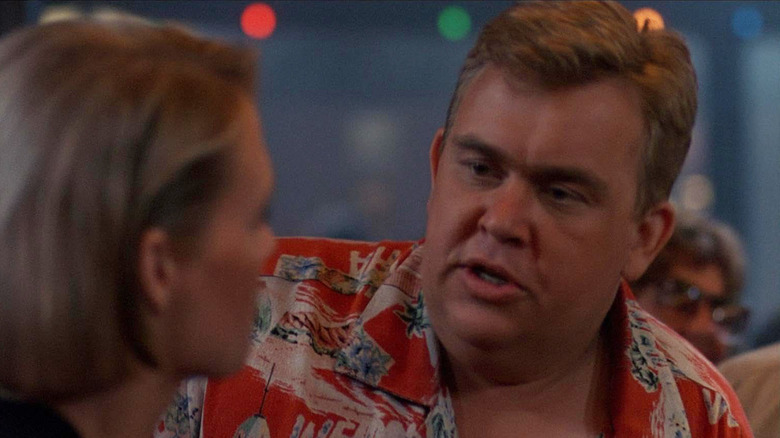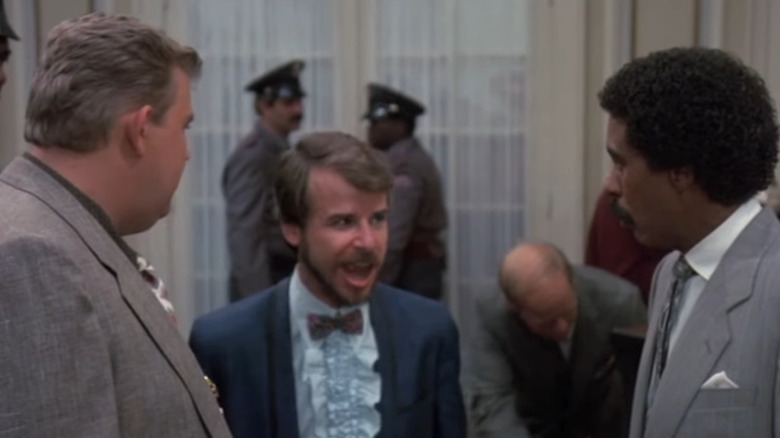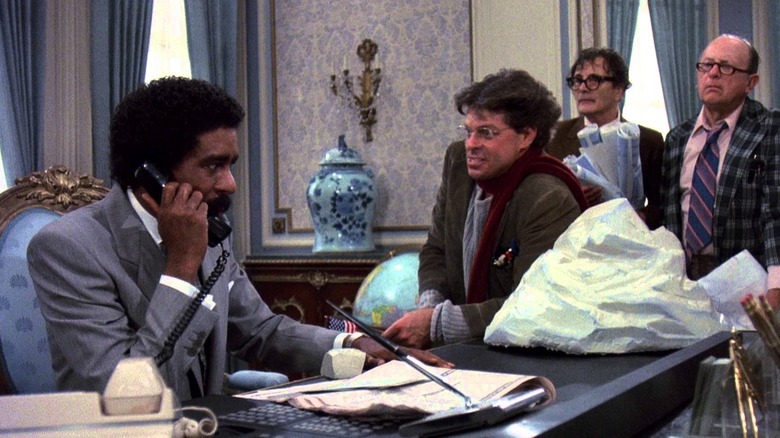Rick Moranis And John Candy's Underrated '80s Comedy Is A Must-Watch For Prime Video Users
We may receive a commission on purchases made from links.
Many 1980s comedy fans will be deeply familiar with Walter Hill's 1985 movie "Brewster's Millions." The film was a big hit for Universal, further cementing the star status of its lead actor, Richard Pryor. Its premise is fun: Monty Brewster (Pryor), a minor league baseball player from New Jersey, stands to inherit $300 million from a recently-deceased uncle. There is, however, a strange game-show-like stipulation: Brewster can either get $1 million now or earn the $300 million by somehow spending $30 million in 30 days. He's only allowed to donate so much to charity, and — here's the weird part — he's not allowed to have anything to show for it. He cannot keep any trinkets he buys. The $30 million must be spent on non-tangibles. If he fails, he gets nothing.
Brewster initially thinks he can spend a lot by moving into an expensive hotel, but that's not enough. He eventually decides to run for mayor of New York on the cynical "None of the Above" ticket. A candidacy is costly, after all. And if he loses (as he intends to), then he'll have nothing to show for it.
"Brewster's Millions" is a fast-forwarded examination of how money clutters everything. Social interactions become suspect when money is involved. Millionaires live wholly disconnected from the rest of the world. Brewster loves the idea of being wealthy at first, but then finds that it's something of a curse. John Candy plays Brewster's best friend, Spike, a catcher on his baseball team and a pragmatic soul. The film also features cameos from many notable guest stars, including Rick Moranis as a bizarre professional mimic who only appears in one scene.
"Brewster's Millions" is readily available on Blu-ray (I hear the commentary track's amazing) and can instantly be fired up on Prime Video. It's an excellent comedy with salient commentary on class and wealth.
Brewster's Millions is a fun and smart comedy
Why is a professional mimic part of "Brewster's Millions?" I think Moranis' character is present to reveal that the ultrarich often attract people with dubious professional functions. He doesn't play a major part in the movie, but it's nice to have a scene where two "SCTV" co-stars share the big screen.
Walter's Hill's "Brewster's Millions" is actually one of many films to be based on the 1902 novel by author George Barr McCutcheon, writing under the handle of Richard Greaves. The premise of the novel is the same (Brewster will inherit a fortune, but only if he can spend one first), although the amounts have changed since 1902. (Brewster has one year to spend $1 million in order to inherit $7 million.) The novel was adapted into a play in 1906 and first made its way to the big screen in the form of Cecil B. DeMille and Oscar Apfel's 1914 film adaptation. (That movie, sadly, is lost to time.) "Brewster's Millions" was then adapted into U.S. and British movies in 1921, 1926, 1935, 1945, and 1961, before Hill took a crack at it in 1985. The 1945 version, starring Dennis O'Keefe as Brewster, might be the best-known pre-1985 film version. There is also a 1937 radio version of the story, starring Jack Benny.
Additionally, "Brewster's Millions" was adapted into two Telugu-language movie adaptations in 1954 and 1985, so the story clearly holds a universal appeal. In fact, several other film adaptations have appeared since Hill's version. In total, there are over a dozen "Brewster's Millions" movies.
Hill's is the most famous, however, and possesses all the class commentary that the original novel put forth. Pryor is perfect as a sarcastic everyman tasked with suddenly traversing the realm of extreme wealth.
Brewster's Millions has a lot to say about class
The most obvious commentary in "Brewster's Millions" is that wealth leads to bedlam. Everyone wants a piece of the action, so the ultra-rich develop an aloof, almost Olympian attitude they can lord over the sycophants they attract. Brewster, an ordinary, middle-class dude, is shocked and baffled by the way the wealthy live and how easy it is to stay wealthy. There's a notion that people who are rich can afford the resources to do things like invest, take out loans, and put up huge amounts of collateral. Money, almost without trying, attracts more money. Poverty, meanwhile, only attracts more poverty. The system is designed to multiply itself, not create economic equality.
And, of course, Hill's film has fun political commentary as well. Brewster sees that two wealthy white men are running for mayor, and he personally can't tell the difference between them. He runs against them, hoping to lose and wanting people to stop voting. Why vote if the candidates only care about the rich? Brewster spends gobs of cash getting that message across. Sadly, his commentary proves to be popular among the people, so Brewster runs the danger of actually getting elected. If he is, he'll have won a cushy job with a high salary. Again, money attracts money, so he withdraws from the race. The other candidates threaten to sue him, so he settles out of court, happy to spend the cash. The wealthy candidates get his cash. Money attracts money.
Through all of this, though, Hill infuses "Brewster's Millions" with an undeniable comedic energy. Everyone in it is funny and it's fun to spot all the cameos. Besides Moranis, one should look out for Archie Hahn, Lin Shaye, Jerry Orbach, and Yakov Smirnoff. It's a hoot.


